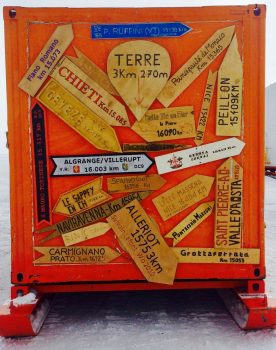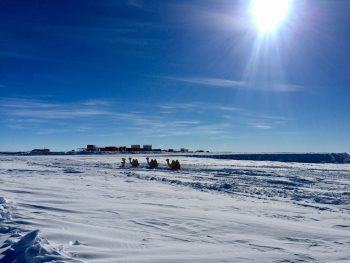Dr. Carole Dangoisse was the ESA-sponsored medical doctor spending 12 months at Concordia research station in Antarctica. She facilitated a number of experiments on the effects of isolation, light deprivation, and extreme temperatures on the human body and mind. In the following post, Carole discusses life in Antarctica.

Credit: ESA/IPEV/PNRA-C. Dangoisse
Food logistics are another critical element of the organisation at Concordia. Inside the station, half the second floor is devoted to food storage. There is a dry foods room, plus a -20 °C walk-in freezer and a +4 °C walk-in fridge for storing dairy products, beverages and fresh fruits and vegetables.
Most of the food is actually kept in containers outside. As the temperatures rarely go above -30 °C, this is an ideal and cost-efficient way to store food for extended periods. There are five containers full of frozen goods, as well as a backup container near the summer camp, and some stocks at the summer camp itself. We might run out of fuel, but we will definitely not run out of food!
This is good to know, considering that the nearest grocery store is thousands of kilometres away, does not do drone delivery, and will be unreachable for nine months.
What’s on the menu?
The chefs obviously spend hours in the kitchen during the summer campaign, cooking for up to 91 people when we are at full capacity in mid-December. There is some overlap between the outgoing summer chefs and the incoming winter-over chefs.
We have buffet-style meals with a vegetarian option always included, fresh bread and scrumptious desserts every day. On Saturday evenings, we usually have pizza after pizza churning out of the ovens, whereas Sunday lunches are a little bit more formal, with white tablecloths on the tables of the cafeteria. No rest for the chefs!
 Best before…
Best before…
There are a few specifics to keeping food for such extended periods. For example, the eggs are coated in paraffin, which means they are still edible months after their expiry date, if a little dehydrated. Surprisingly they actually still make great omelets. The only thing is both the yolk and egg whites shrink so much you need double the amount for any recipe. In addition, the combination of these ‘dry’ eggs and the low pressure means that a lot of cakes and pastries rise and then fall spectacularly like failed soufflés.
Finally, as it is extremely difficult to estimate how much food will be needed each year, and transporting surplus back to the coast is costly, all the leftovers accumulate after each winter-over.
Finding frozen or dry food way past its expiry date (but still very good!) actually becomes something of an inside joke amongst the winter-over crew. Our record is mackerel expired in 1999. Truthfully, though, we have no plan to taste that one…
Despite this, I must admit I had not thought I would be this spoiled for choice with the food! And having a private chef for a whole year is definitely a luxury.




Discussion: no comments